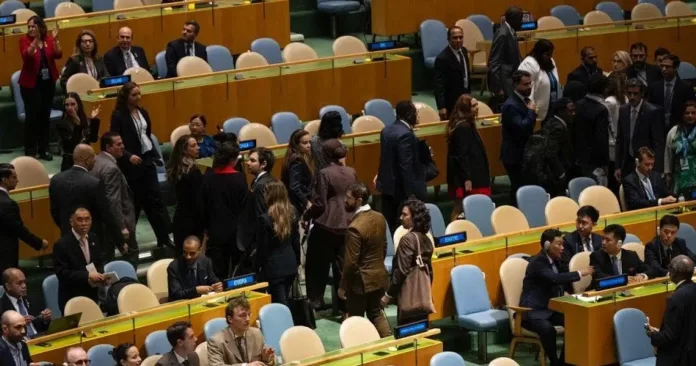Delegates walk out and protesters flood NYC as Netanyahu speaks under ICC arrest warrant shadow
Israeli Prime Minister Benjamin Netanyahu was met with open hostility on Friday as he addressed the United Nations General Assembly (UNGA), facing protests on the streets of New York City and diplomatic snubs inside the hall.
As he began his speech on the fourth day of the General Debate, dozens of diplomats stood up and walked out, signalling growing international frustration with Israel’s ongoing military campaign in Gaza. Outside the UN complex, thousands of demonstrators gathered to denounce the prime minister, waving Palestinian flags and chanting demands for an arms embargo.
The protests stretched from Times Square to the East River, where the UN headquarters sits. Marchers carried effigies of Netanyahu in handcuffs and shouted slogans calling for his arrest under the International Criminal Court (ICC) warrant issued against him in 2024.
Al-Sharif Nassef, one of the demonstrators, said the prime minister belonged in The Hague, not on the UN’s stage. “It is a shame that Netanyahu is in New York instead of answering for his crimes at the ICC,” Nassef told Al Jazeera. “All the New Yorkers here today support his arrest. He is not welcome.”
Calls for his detention have intensified after Zohran Mamdani, the Democratic nominee for New York City mayor, pledged earlier this month to enforce the ICC’s arrest warrant should Netanyahu set foot in the city. Yet the United States is not a signatory to the Rome Statute that underpins the ICC, leaving questions about whether local authorities have the power to carry out such an arrest.
Inside the UN, Netanyahu’s speech was overshadowed by the wave of boycotts. At the same time, diplomats from dozens of nations gathered as part of the Hague Group to discuss coordinated responses, including possible sanctions against Israel. The group’s deliberations reflect a sharp shift in the tone of international diplomacy, with frustration mounting over Israel’s nearly two-year offensive in Gaza.
For protesters, the issue remained deeply personal and visceral. Many carried banners linking everyday survival items in Gaza to accusations of collective punishment. “Is baby formula Hamas?” one sign read, echoing the outrage over reports of shortages and blockades in the besieged enclave.
The demonstration featured flags not only of Palestine but also of Colombia and Ireland – two countries that have spoken out strongly in defence of Palestinian rights. With a heavy police presence shadowing the march, protesters demanded immediate sanctions and an end to arms transfers enabling Israel’s military actions.
Netanyahu, however, remained defiant. Despite the walkouts, he insisted in his speech that Israel must “finish the job” in Gaza. His remarks further inflamed critics, who argue the campaign has already inflicted intolerable civilian suffering.
The backdrop to his appearance was one of mounting isolation. Once a central figure courted by world leaders, Netanyahu now confronts legal jeopardy, international condemnation, and visible opposition even in New York – a city long considered a bastion of diplomatic protection for Israeli leaders.
The convergence of protests, diplomatic boycotts, and ICC proceedings has placed Netanyahu at the centre of a storm that shows no sign of abating. As Gaza continues to endure devastation, the gap between Israel’s government and the global community appears to be widening into a chasm.
